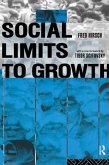A sleeper hit of economics! Its brilliant insights have become ever more relevant as liberal capitalism confronts challenges from austerity to the global race for resources. A book whose message is more urgent now than on its publication nearly 50 years ago. This Routledge Classics edition includes a new Foreword by Daniel Halliday.
'Important books are rare. They are all the more welcome when they appear; and one need have no hesitation in naming as a classic Fred Hirsch's new analysis of the inherent defects of the market economy as an instrument of human amelioration.' - Peter Jay, The Times
'An exceptionally interesting, original, and well-written book on one of the most important themes: what are the fruits of economic growth and why do they seem increasingly disappointing?' - The Economic Journal
'This highly original book makes a compelling argument that affluence, by creating a kind of congestion (much more than simple crowding), limits the welfare attainable by society as a whole.' - Foreign Affairs
'An exceptionally interesting, original, and well-written book on one of the most important themes: what are the fruits of economic growth and why do they seem increasingly disappointing?' - The Economic Journal
'This highly original book makes a compelling argument that affluence, by creating a kind of congestion (much more than simple crowding), limits the welfare attainable by society as a whole.' - Foreign Affairs








